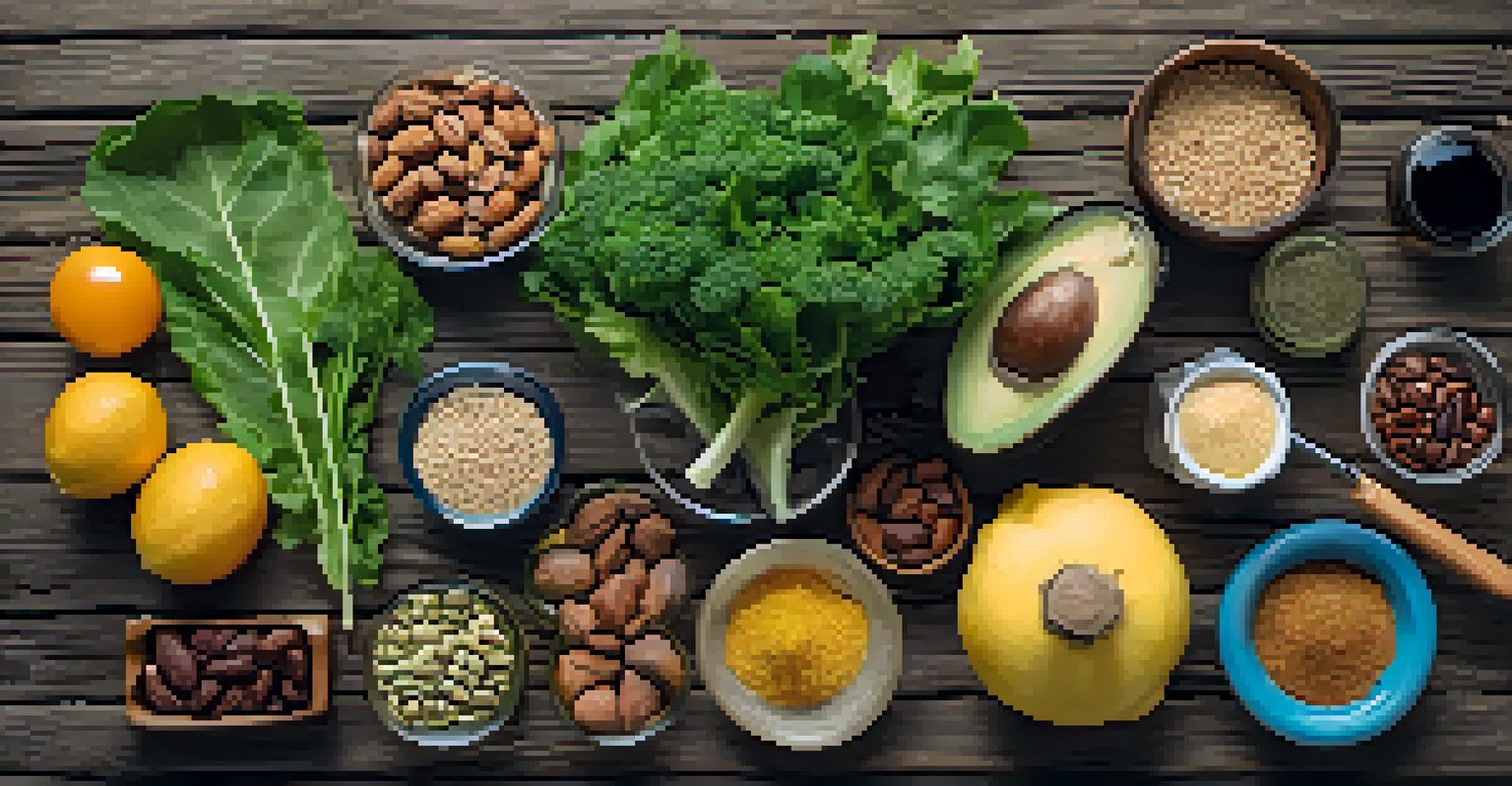Supplements for Aging Athletes: What Works and What Doesn’t

Understanding Nutritional Needs of Aging Athletes
As athletes age, their bodies undergo various changes that affect performance and recovery. Nutritional needs evolve, often requiring adjustments in diet and supplementation to maintain energy levels and muscle mass. For instance, older athletes may find that they need more protein to support muscle repair and growth compared to younger athletes.
The greatest wealth is health.
Additionally, the body's ability to absorb nutrients can decrease with age, making it essential to choose supplements that are easily digestible and bioavailable. This means the body can readily utilize them, maximizing the benefits. A well-rounded approach to nutrition becomes even more crucial as aging athletes strive to maintain their competitive edge.
Understanding these unique needs is the first step in determining which supplements may be beneficial. It’s important to consult with a healthcare professional to tailor a supplementation plan that aligns with individual health goals and activity levels.
Protein Supplements: Building Blocks for Muscle Maintenance
Protein is vital for athletes of all ages, but its importance becomes even more pronounced as we age. Aging can lead to muscle loss, known as sarcopenia, making protein supplements a key ally in preserving muscle mass. Whey protein, for instance, is a popular choice due to its complete amino acid profile and quick absorption rate.

Incorporating a high-quality protein supplement can aid recovery after workouts, enhance strength, and support overall performance. It’s not just about muscle; protein also plays a role in hormone production and immune function, which can decline with age. Many aging athletes find that a protein shake post-workout helps them meet their daily protein needs more easily.
Aging Athletes Need Nutritional Care
As athletes age, their nutritional needs change, requiring adjustments in diet and supplementation to support performance and recovery.
However, it’s essential to remember that protein supplements should complement a balanced diet rather than replace whole food sources. Foods like lean meats, fish, dairy, beans, and legumes should still be staples in an athlete's nutrition plan for a well-rounded intake.
Omega-3 Fatty Acids: Heart and Joint Health Benefits
Omega-3 fatty acids, commonly found in fish oil, are celebrated for their anti-inflammatory properties, which can be particularly beneficial for aging athletes. As we age, joint pain and stiffness can become more prevalent, making omega-3s a valuable addition to a supplement regimen. These fatty acids can help reduce inflammation and support joint health, allowing for a more comfortable workout experience.
You can’t put a limit on anything. The more you dream, the further you get.
Moreover, omega-3s are linked to heart health, which is crucial for athletes looking to maintain endurance and overall cardiovascular fitness. They may also improve recovery times after intense training sessions, making it easier to bounce back for the next workout. Including omega-3 supplements can thus contribute not just to joint health but also to overall athletic performance.
It's important to note that not all omega-3 supplements are created equal. Look for high-quality formulations that contain EPA and DHA, the most beneficial forms of omega-3s. Consulting with a healthcare provider can help determine the right dosage and ensure safety.
Creatine: A Powerhouse for Strength and Performance
Creatine is often associated with younger athletes, but it can also be highly beneficial for aging athletes looking to enhance strength and power. Research shows that creatine supplementation can improve muscle mass and enhance recovery, making it a valuable tool in the arsenal for older athletes. It helps replenish ATP, the energy currency of our cells, allowing for better performance during high-intensity workouts.
While some may worry about the safety of creatine for older adults, studies indicate it can be safe when used appropriately. It may even offer cognitive benefits, as creatine is thought to support brain health, which is an essential aspect of overall athletic performance. The key is to start with a low dose and monitor how your body responds.
Protein is Key for Muscle Support
Older athletes benefit significantly from protein supplements to combat muscle loss and enhance recovery after workouts.
However, it’s crucial to pair creatine supplementation with proper hydration and a balanced diet. This ensures that the body can effectively utilize the creatine while minimizing any potential side effects.
Antioxidants: Combatting Oxidative Stress from Training
As athletes age, oxidative stress from rigorous training can take a toll on the body, leading to fatigue and longer recovery times. Antioxidants, such as vitamins C and E, as well as compounds like resveratrol and curcumin, can help combat this stress. These substances neutralize free radicals, which are unstable molecules that can damage cells and contribute to aging.
Incorporating a good antioxidant supplement can support overall health and enhance recovery, helping aging athletes bounce back faster. However, it's essential to find a balance, as excessive antioxidant supplementation may interfere with the beneficial effects of training adaptations.
Natural sources of antioxidants, such as colorful fruits and vegetables, should also be a staple in an athlete's diet. A holistic approach that combines both diet and supplementation often yields the best results in managing oxidative stress.
Vitamin D: Essential for Bone Health and Performance
Vitamin D plays a critical role in bone health, which is essential for athletes of all ages, particularly those who are aging. With age, the risk of osteoporosis and fractures increases, making adequate vitamin D levels vital for maintaining bone density and strength. Many older athletes find that supplementation helps ensure they reach the recommended vitamin D levels, especially if they have limited sun exposure.
Beyond bone health, vitamin D also supports muscle function and immune health, further enhancing performance and recovery. A deficiency can lead to muscle weakness and increased risk of injuries, which can significantly impact an athlete's ability to train effectively.
Essential Supplements for Health
Supplements like omega-3 fatty acids, vitamin D, and magnesium are crucial for joint health, bone strength, and overall recovery in aging athletes.
While vitamin D can be obtained through sunlight and certain foods, many find that a supplement is necessary to achieve optimal levels. Regular testing can help determine if supplementation is needed and ensure that athletes are not exceeding safe limits.
Magnesium: A Key Mineral for Recovery and Relaxation
Magnesium is often overlooked, yet it plays a crucial role in muscle function and recovery for aging athletes. This essential mineral helps with muscle contractions, energy production, and even relaxation, which is critical for post-workout recovery. Many athletes find that magnesium supplements can alleviate muscle cramps and promote better sleep, both of which are vital for optimal performance.
Moreover, magnesium is involved in over 300 biochemical reactions in the body, making it essential for overall health. Aging can lead to decreased magnesium absorption, so supplementation may be necessary to maintain adequate levels. Foods rich in magnesium, such as nuts, seeds, and leafy greens, should also be incorporated into an athlete's diet.

Athletes should be mindful of their magnesium intake, particularly during periods of intense training when the body requires more. A balanced approach that includes both dietary sources and supplements can help ensure sufficient magnesium levels.